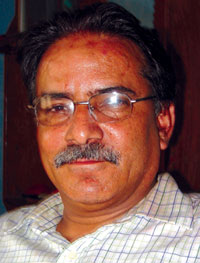|
|
As the peace process stalls, the conflicting demands on the Maoist leadership are becoming increasingly evident. Most realise the need to end the violent conflict, but many Maoist cadres, driven by years of hard-left indoctrination, are holding out for ultimate victory. Balancing these goals can be frighteningly difficult. How is Prachanda handling this job?
This week provided a rare opportunity to watch the 'awesome one' in action. As the local representative of an international tv news channel, I had requested an interview with Prachanda. We were to meet at a location on the outskirts of Kathmandu for an on-camera interview.
When we arrived, Prachanda and other senior Maoist leaders were already there, attending the internal meeting of a Maoist-affiliated organisation which was holding its convention. Between the meeting and our interview, Prachanda addressed his cadres in a large hall.
This was no ordinary speech. It was aimed at his own cadres during a time of great uncertainties in the peace process.
"Comrades," Prachanda began. The large hall went silent. Dozens of digital cameras flashed in unison. "We are at a crucial moment in the peace process," he said. "We are here for peace, but the SPA does not seem serious. They have used us to regain power and are now sitting comfortably on their chairs."
For 20 minutes Prachanda spoke to a rapt audience. His tone was authoritative and final, and the words relatively measured-until the last five minutes. "The party has placed great faith in you," his voice began to rise. His portly Mao suit-clad body began to sway. His arms flailing, his bulbous face brimming with emotion, Prachanda began to rally his troops.
"You have arrived in Kathmandu to attend your conventions. In one or two months, you will be going among the people whipping up a hurricane. There is no turning back. You will bring a hurricane.We will soon shatter the illusions of those sitting inside Baluwatar and Singha Darbar."
The mass of cadres, silent for much of the speech, began to respond. Thunderous applause erupted and fists raised in the Maoist salute.
Twenty minutes later, Prachanda sat in a private room facing a tv camera. Wiping his sweaty forehead, he looked eager to begin the interview.
It was quite a transformation. From a fiery revolutionary rallying his troops just 20 minutes before, Prachanda was now coming across as a statesman. He knew he was addressing a global-and American- audience.
He spoke in measured tones, smiled often at the camera, and cracked a few jokes. He talked about his family, what he eats and drinks, what his life was like in the jungle. He even spoke of the Hollywood movie he enjoys watching (Spartacus). But time and again, he returned to one message: Don't be afraid of us. We are not classical dogmatic communists. We are willing to adapt.
"We are communists, so of course we believe in socialism and communism. That is our ultimate goal, but due to regional and international situation, we are willing to discuss all issues," he said. "We are not dogmatic communists. We are not mechanical. In fact, we are fighting for capitalistic mode of production. We are fighting against feudalism."
Prachanda made his pitch clearly understanding that the interview will play to an American audience: "The chances of a peaceful transition are greatest at this time. but the US government and ambassador are making false accusations against us, trying to paint us as terrorists. Why they want to sabotage the peace process, I cannot understand."
Cut to remote Kanpur village in Kabhre district, where I met a few PLA fighters the day after this interview. Asked if a political compromise would be acceptable, one young soldier said, pointing towards his gun, "Our party has taught us that this gun can be used against the enemy as well as to cleanse the party. We are a party of the people. We don't believe our leadership will go against the people's wishes. The people want total victory."
The 'awesome' one has an awesome job on his hands.




